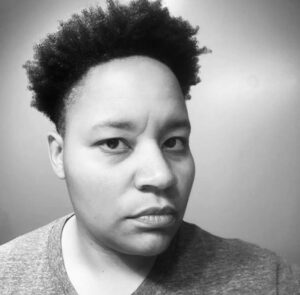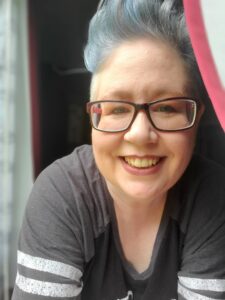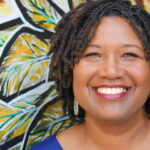 Tamara Winfrey-Harris is a writer who specializes in the ever-evolving space where current events, politics and pop culture intersect with race and gender. She says, “I want to tell the stories of Black women and girls, and deliver the truth to all those folks who got us twisted—tangled up in racist and sexist lies. I want my writing to advocate for my sisters. We are better than alright. We are amazing.”
Tamara Winfrey-Harris is a writer who specializes in the ever-evolving space where current events, politics and pop culture intersect with race and gender. She says, “I want to tell the stories of Black women and girls, and deliver the truth to all those folks who got us twisted—tangled up in racist and sexist lies. I want my writing to advocate for my sisters. We are better than alright. We are amazing.”
Tamara is the author of two books: The Sisters Are Alright: Changing the Broken Narrative of Black Women in America (Berrett-Koehler Publishers 2015) and Dear Black Girl: Letters From Your Sisters On Stepping Into Your Power (Berrett-Koehler Publishers 2021). The award-winning Sisters, now in its second edition, has been optioned by Wise Entertainment and Gabrielle Union’s production company I’ll Have Another to be turned into a dramedy for television.
Tamara’s work has been published in media outlets, including including The New York Times, The Atlantic, Cosmopolitan, New York Magazine and The Los Angeles Times. And her essays appear in The Lemonade Reader: Beyonce, Black Feminism and Spirituality (Routledge, 2019); The Burden: African Americans and the Enduring Impact of Slavery (Wayne State University Press, 2018); Black in the Middle: An Anthology of the Black Midwest (Black Belt Publishing, 2020); and other books.
Tamara is co-founder of Centering Sisters, LLC, an organization that unapologetically addresses the needs and issues of Black women and girls; and the Black Women’s Writing Society, a monthly virtual space for Black femme creatives. She is also a certified yoga teacher who focuses her work on the healing and well-bring of her sisters.
Tamara is a native of Gary, IN, and a proud member of Alpha Kappa Alpha, Sorority, Inc. She graduated with a BA degree from the Greenlee School of Journalism at Iowa State University.
Tamara will give Thursday night’s Keynote Speech, “The Real Work of Being a Writing Ally” about creating spaces where all writers can thrive. She will also be teaching “Instructions for a Writer’s Life” and participating in the panel, “Diversity and Inclusivity in Literature and Publishing.”
Check out the Full Faculty and the Conference Schedule…
…then visit our Registration Page!
Q&A with Tamara
Reading Tamara Winfrey-Harris’s books gives the sensation few books do: it’s raw power. Her words give voice to the underserved and maligned Black women. After reading The Sisters Are Alright: Changing the Broken Narrative of Black Women in America, I’m eager to hear her speak about how we in the writing community–and the Midwest–can create space for these stories to be told and lifted up.
MWW: Your keynote speech centers on the necessity of being an ally specifically in literary spaces, and I am thrilled that our attendees will hear this. What are the best practices a writing community—from individual members to organizations such as ours—can adopt to ensure, enact, and broadcast their inclusivity of authors from all backgrounds?
 TWH: Read broadly: If you only read books by men or straight writers or White writers, you are missing a lot. (Ditto if you just read fantasy or non-fiction) Make your “to be read” list as rich and varied as the human experience. It will make you a better writer. It will make you a more expansive person. It is a simple way to support fellow writers who are frequently under-appreciated and under-resourced.
TWH: Read broadly: If you only read books by men or straight writers or White writers, you are missing a lot. (Ditto if you just read fantasy or non-fiction) Make your “to be read” list as rich and varied as the human experience. It will make you a better writer. It will make you a more expansive person. It is a simple way to support fellow writers who are frequently under-appreciated and under-resourced.
Create a diverse writing community: Make it a priority to build authentic relationships with writers of color, women writers, LGBTQ writers, and immigrant writers. All of us bring our different identities to our creativity. A diverse writing community opens a window to a more spacious imagination. It will help you understand the many contours–unique opportunities and challenges–a writer’s life can take.
Champion diversity and pass the baton: Conferences, workshops, MFA programs and literary events will never represent the breadth of the writing experience until we, as writers, demand it and work to make it happen. That means if you are asked to join a panel and you find that everyone on that panel is white or has an MFA or is cisgender, it is your duty to ask why and possibly to give up your seat to change that. By creating a diverse writing community will be armed to recommend fellow writers to diversity writing spaces.
MWW: We’re holding a panel about Diversity and Inclusivity in Literature and Publishing. Faculty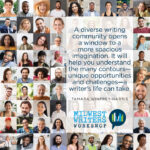 member Saundra Mitchell has been instrumental in its development. In your experience, what does a healthy diversity panel look like (is there such a thing)? What is the best outcome such a panel?
member Saundra Mitchell has been instrumental in its development. In your experience, what does a healthy diversity panel look like (is there such a thing)? What is the best outcome such a panel?
TWH: A good DEIB panel preferences the voices of people who have been historically marginalized; has firm rules of engagement for participants; and offers some practical answers as well as exploring challenges.
MWW: What are some of your tried-and-true practices for getting to the page while also adulting?
TWH: The key to my regular writing practice and hitting critical deadlines is writing in community and finding writing time that meets my creativity and energy flow. My muse is most active in the morning, so when working on a book manuscript, my approach has looked like 6 a.m. Zoom writing appointments three times a week with a writerly friend. Sometimes, we write in silence, and sometimes, we read lines or passages for feedback. I also co-founded the Black Women’s Writing Society in Indianapolis to carve out monthly creative space for me and other Black women writers.
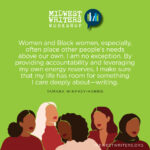 Women and Black women, especially, often place other people’s needs above our own. I am no exception. By providing accountability and leveraging my own energy reserves, I make sure that my life has room for something I care deeply about–writing.
Women and Black women, especially, often place other people’s needs above our own. I am no exception. By providing accountability and leveraging my own energy reserves, I make sure that my life has room for something I care deeply about–writing.
MWW: Who are some of the writers who have influenced you?
TWH: As a writer who specializes in the intersection of gender and race, I stand on the shoulders of great feminist writers, such as bell hooks and Audre Lorde and Toni Morrison and Lucille Clifton. And I am continually inspired by contemporary writers like Deesha Philyaw and Dawnie Walton. Early in my writing career, I wrote for the late great blog, Racialicious, which highlighted popular culture through an anti-racist lens. My fellow writers–Carmen Sognonvi, Latoya Peterson, Arturo Garcia, Kendra James and others there taught me how to write about tough and complicated issues in a way that is engaging and digestible for everyone.
COMING SOON FROM TAMARA
Empowering, feminist guidance for Black women on living unapologetically and authentically—from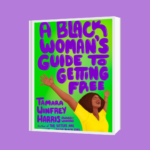 the bestselling author of The Sisters Are Alright.
the bestselling author of The Sisters Are Alright.
Unshackle your authentic self from the expectations and stereotypes of American culture through the 6 pillars of living free as a Black woman.
Tamara Winfrey Harris harnesses her knowledge as a two-time author and storyteller of the Black femme experience and nationally known expert on the intersections of race and gender to deliver a sharp feminist analysis that is illustrated by real-life stories and examples plucked from popular culture and intimate Black woman-to-Black woman truth-telling.
Coming July 9!
Join us for #MWW24!
We’ve put together a broad range of workshops led by top-notch faculty so that you can reach new heights with your writing alongside brilliant writers from the Midwest and beyond!
*Attend online or in-person*
MWW is dedicated to building a community where writers can network with others and grow.
Click here for In-Person Registration
Click here for Virtual Registration
Thank you to our Silver Sponsor, Nate Hoffelder–
The Author Website Guy!
Nate Hoffelder has been helping people fix broken tech since 2010. He turns broken down WordPress sites into sites which convert visitors into superfans, also builds sites from scratch, and helps authors with their social media and newsletters.
Nate is on the board of the Florida Writers Foundation, and volunteers with SF cons. In his spare time, Nate maintains three Little Free Libraries.
MWW24 Advertising Opportunities
Advertising opportunities are available for all! In our conference program, newsletters, or our website Bulletin Board. Services for writers? New book to promote? Business cards from registered attendees? We’d love to share!
(Note: advertising is not limited to attendees but is subject to MWW Board review)


